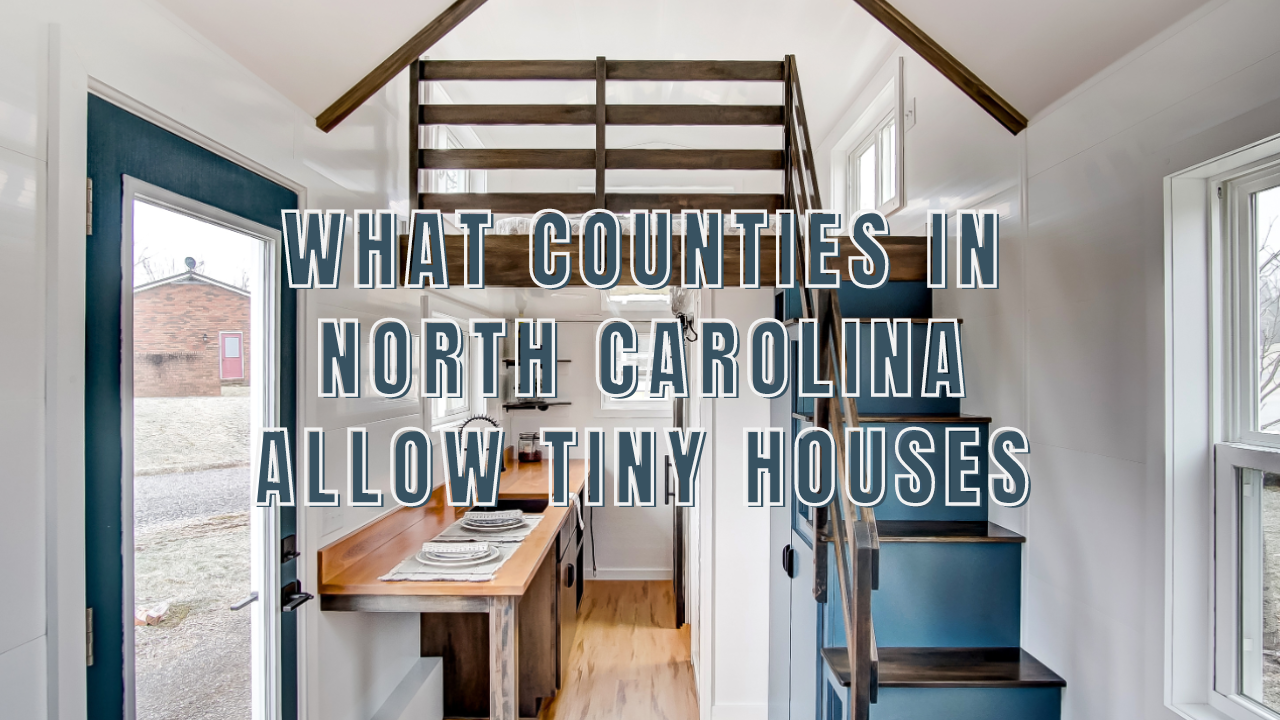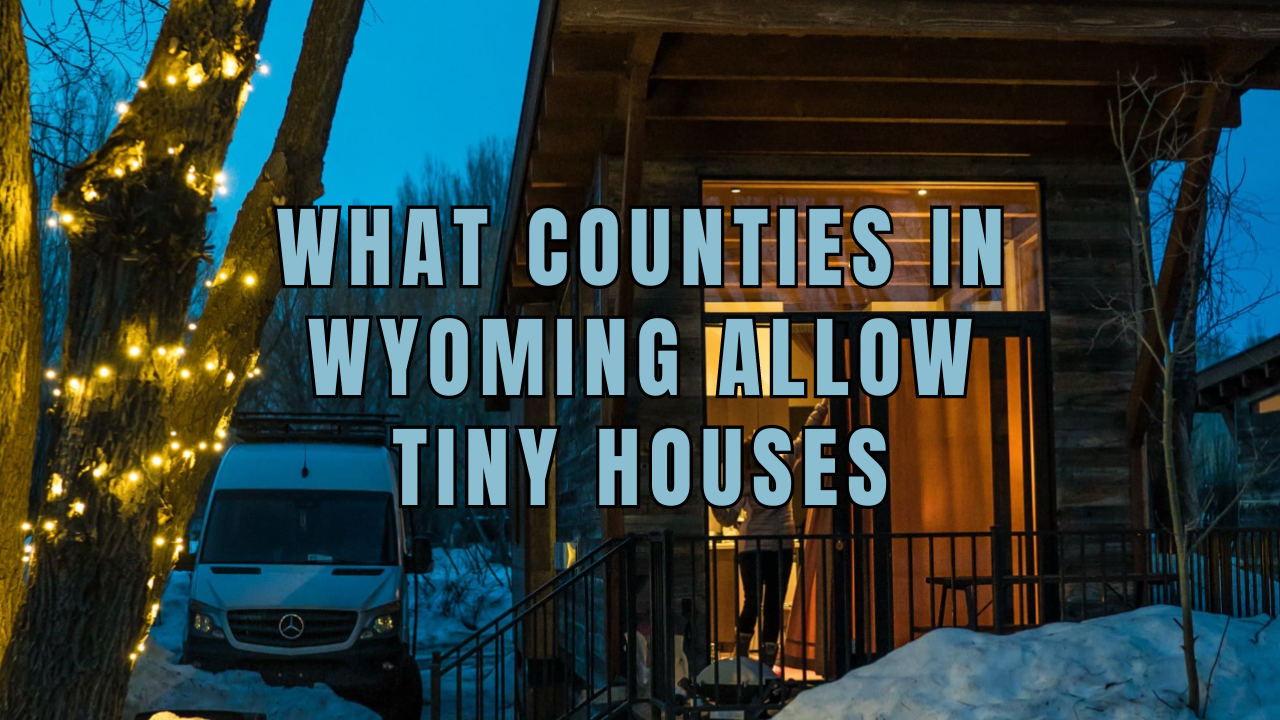If you are considering an affordable tiny home for sale in North Carolina, check out the rules and regulations that govern these unique dwellings. While the state of North Carolina allows for tiny houses to be parked on certain properties, there are several considerations to address.
Each county in North Carolina has specific regulations regarding tiny houses, including restrictions on the gross floor area and habitable space. Before you decide to park your tiny home in the state, read and discover which counties allow tiny homes in North Carolina and the legal requirements and limitations that may apply.
Tiny House Prices in North Carolina
If you start your tiny house initiative, you are probably wondering what possibilities will satisfy your compact living goals and your budget.
Fantastic news! We provide options to suit every living style and price range to assist you in taking the next step toward your living project. Discover tiny homes for sale in North Carolina!
What Counties in North Carolina Allow Tiny Houses?
Tiny homes are gaining appeal as a cheap and ecological dwelling choice. In North Carolina, tiny home acceptability varies across counties, with different rules and regulations controlling their siting and construction.
Building laws for small homes in North Carolina must meet protection criteria, which include electricity, plumbing, insulation, and ventilation. Off-grid living rules, such as those governing solar panels and composting toilets, differ by county and city.
Most counties define tiny dwellings as RVs, and living in RVs full-time is often prohibited. However, some counties offer concessions, such as tax breaks, to favor small-home living.
Jackson County
It stands out as a suitable setting for tiny homes in western North Carolina. The county changed its construction and zoning standards to include small dwellings, demonstrating a balance between maintaining tradition and keeping up with current housing trends.
Tiny homes in Jackson must satisfy specific requirements, including RVIA certification, correct anchoring, and compliance with the International Residential Code. In addition, the Department of Public Health should check composting toilets.
Tiny House Regulations And Rules In North Carolina
Permanent Structure Rules
Tiny homes are subject to the same permanent structure rules as traditional houses. It includes compliance with zoning regulations, building codes, and permits for utilities. Additionally, there may be specific requirements for the size and location of tiny homes. It’s important for those interested in building a tiny house to thoroughly research and understand the regulations and rules in their area.
- Tiny homeowners require permission from their local authority.
- The small home and its foundation need to adhere to the North Carolina State Residential Code.
- Tiny dwellings have to agree with zoning, setbacks, and any community protective covenant restrictions.
- It requires a livable place to sleep, eat, and cook.
- Except for the kitchen, habitable rooms need a minimum floor space of 70 square feet. It must be at least 7 feet horizontally.
- Ceilings must rise at least 7 feet high in inhabitable spaces, restrooms, toilet rooms, and passageways.
- Tiny houses demand a kitchen with a sink.
- Owners must connect the plumbing fittings to an authorized sewage disposal system. Storage tanks are unacceptable.
- Toilet amenities, including a lavatory, water closet, bathtub, or shower, are necessary for tiny houses.
- The dwelling unit needs a heating system following Section R303.8 of the North Carolina Residential Code.
- The small house has to meet the means of egress and energy conservation criteria outlined in the North Carolina Administrative Code.
Temporary Structure Rules
Temporary structures, like tiny houses, are subject to specific regulations and rules. These rules may include restrictions on size, location, and permits required for construction. It’s important for people interested in building a tiny house to be familiar with the local regulations and ensure compliance before starting their project.
- It’s necessary to establish and inspect the electrical supply system.
- Install a power supply feeder permanently. If not, the park trailer’s power supply requires a feed assembly with a 50-ampere or 30-ampere power supply cord that is firmly fastened to the cap.
- This compact dwelling does not allow permanent mechanical or plumbing connections.
- These tiny house modules do not support accessory buildings.
- They are temporary residences in North Carolina. Thus, they have to adhere to electrical codes and inspection specifications.
Transitional Structure Rules
There are regulations and rules in place for tiny houses and transitional structures, like size, placement, and safety standards for these houses. For example, tiny houses may be subject to zoning laws and building codes and may need to meet some requirements for electrical and plumbing systems. It’s important for individuals looking to build or live in a tiny house to familiarize themselves with these regulations to ensure compliance.
- The 180–500 square foot small dwellings are unique.
- The monthly payments required by the state range from $350 to $525. Utilities already appear in the price.
- Residents have no restrictions on how long they can stay in the transitional tiny homes as long as they follow the rules set forth for them. They can suggest organizations for assistance.
In North Carolina Where Can I Build A Tiny House?
Your tiny house’s location is fundamental. Find a licensed tiny house contractor to help you with the procedure, handle every piece of paper, and confirm that your home satisfies all construction requirements.
Building a tiny house is a huge task, but if you plan, it doesn’t have to be a hassle. The following are common locations for small homes:
- RV parks
- National Parks and campgrounds
- Tiny house communities
- Private properties
North Carolina Tiny Home Communities
Tiny home communities sometimes include a parking spot for proprietors, plus water, sewage, and power hookups. Beautiful cozy properties are ready to move into and are available in a few of these eco-villages and tiny home communities in North Carolina.
Acony Bell
Acony Bell is arguably the most well-known tiny home community in North Carolina. The majestic Blue Ridge Mountains around Acony Bell, which sits halfway between Asheville and Brevard. Every homeowner will have plenty of room to themselves and unobstructed views of the grass and wooded hills, thanks to the 50 acres of land.
The ideal location of Acony Bell gives you the feeling of being in the woods but also guarantees that you are never far from the town’s conveniences. Excellent community features include a community center, bike and hiking paths, a creek, a chicken coop, and a communal garden.
Simple Life
A firm called Simple Life is the owner of multiple tiny home communities in North Carolina. These comprise The Meadows, The Village, and The Hamlet. You will buy one of the company’s cottages, which come in models with one or two bedrooms. You will be able to personalize your house.
Numerous facilities are available in the villages of Simple Life. A clubhouse, yoga studio, fitness facility, dog park, bocce ball court, community garden, library, and meditation garden are just a few of the amenities that await you.
Tiny House Builders Near Me
You can pick your ideal home without searching for nearby builders thanks to Great Lakes Tiny Homes, which provides a selection of tiny home designs with across-the-nation delivery.
Further, the RV Industry Association (RVIA) backs Great Lakes Tiny Homes. A business dedicated to the strictest adherence to construction, safety, and legal requirements for tiny houses, in addition to the highest manufacturing standards.
Do I Need a Certified Builder?
Yes, you do. You could think about doing it yourself, but there are more challenges and uncertainties involved.
Dealing with a builder company that obtained RVIA certification, such as Great Lakes Tiny Homes, ensures that the tiny house you purchase was constructed in compliance with laws and regulations.
It also ensures that the materials in your house are high-quality, long-lasting, and safe.
Working with a registered contractor also offers access to protection and financing options. Your tiny home is a safe and livable space, provided it complies with RVIA requirements.
FAQs
Can You Make a Tiny House in North Carolina Your Main Residence?
In North Carolina, you can reside permanently in a tiny house.
Please bear in mind that local regulations and statutes may differ. The most suitable action is determining whether your small home complies with all applicable laws and regulations, particularly inspection requirements, and contacting your local zoning and authorities.
If you want to enjoy the benefits of a more minimalist, environmentally friendly lifestyle in North Carolina, complete your research and work with licensed builders.
Does My Tiny Dwelling Need to Pay Property Taxes?
Tiny homes are immune from property taxes, in contrast to regular residences. However, since tiny houses on wheels qualify as recreational vehicles in North Carolina, you are obligated to pay property taxes on them. Thus, mobile home property taxes may be applied.
You will also be responsible for real estate taxes if your tiny temporary residence or permanent residence is set on land that you own.
How Tiny Can a North Carolina House Be?
A tiny home typically has a floor area of 60 to 400 square feet.
Each county in North Carolina has a different minimum small home size. A livable room in Jackson County needs to have a gross floor space of at least 120 square feet. A minimum of 150 square feet and an extra 100 square feet for each new resident are essential in Wilmington and Charlotte.
However, Raleigh defines small housing as structures with a gross floor size of less than 600 square feet.
Conclusion
While some counties and towns in North Carolina permit small houses, others have rigorous building standards and zoning laws that restrict their size, location, and design. Popular tiny house communities include amenities and services for small homeowners, such as hiking paths, gardens, clubhouses, and fire pits.
In short, tiny homes are a realistic and appealing alternative for living in North Carolina, but they need careful planning and compliance with applicable legislation.





